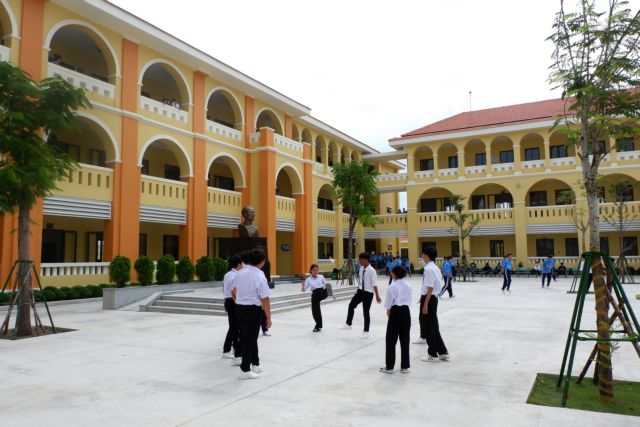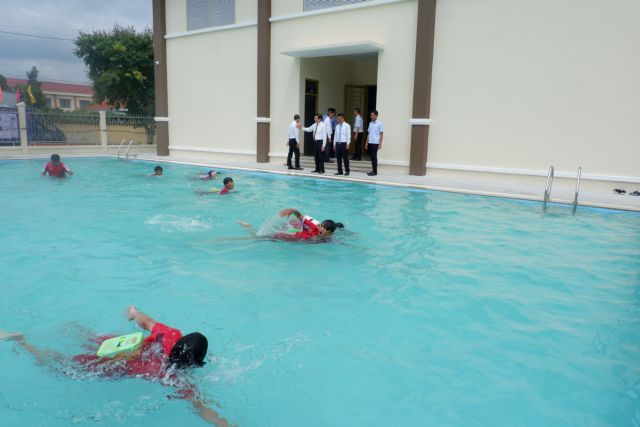Long An reaps social benefits of school construction
Society – Economy - Ngày đăng : 08:26, 14/12/2024
 |
| Võ Văn Tần High School in Đức Hòa Đông Commune of Đức Hòa District, Long An Province, was opened for 2024–2025 school year. VNA/VNS Photo |
With the rapid industrial development in the southern province of Long An, providing sufficient schools to accommodate the surge in population growth has become essential.
Dozens of public modern schools have over the past decade been built, and several have been developed into high-quality educational centres.
These projects, which have mobilised over VNĐ100 billion (US$4.1 million) from social efforts, have brought about a remarkable change to the education landscape in Long An.
At the beginning of the 2024–2025 school year, the Long An People's Committee [Provincial administration] inaugurated Võ Văn Tần High School in Đức Hòa Đông Commune, Đức Hòa District.
It is the first public school in Việt Nam to receive the EDGE Green Building certification from the International Finance Corporation (IFC).
The Võ Văn Tần High School is also a national standard school with a developmental orientation towards a high-quality educational model.
The school was built on an area of more than 3.1ha, comprising 28 classrooms, nine specialised rooms, 17 functional rooms and other facilities such as a football field, parking areas and a running track, accommodating more than 2,000 students.
It is equipped with essential features to help students engage with future green transition trends. The building's surfaces are painted with heat-reflective coatings to prevent heat absorption and extend the building's lifespan.
Classroom windows are covered with special coatings that reduce solar heat gain and thermal conductivity, minimising sunlight radiation entering indoor spaces and enhancing daylight efficiency.
Lighting and sanitation equipment have also been optimised for energy and water savings.
Thanks to its green and efficient design, the school has reduced its energy consumption by 47 per cent, water usage by 37 per cent and embodied energy in materials by 57 per cent, according to school Principal Huỳnh Công Thành.
Aside from Võ Văn Tần High School, several other schools in the province have also been developed to meet national standards.
For instance, Nguyễn Trung Trực High School in Bến Lức District was built with an investment of VNĐ150 billion ($6.1 million) on an area of more than 3.7ha. It is also designed to follow a high-quality educational model.
The school has been operational for over a year and has alleviated difficulties in high school enrolments in the district.
Now with 43 classes, including eight high-quality classes, the school caters to 1,746 students and employs 80 staff members for this academic year. It focuses on practical learning methods, enhances STEM education and promotes extracurricular activities to foster interactions between teachers and students.
In Đức Hòa District, Trương Minh Bạch Secondary School was built at a cost of more than VNĐ100 billion ($4.1 million) in Đức Lập Thượng Commune and opened in September 2022. The project was personally funded by benefactors Dr Trương Minh Tuyết’s family and educator Trần Đình Chiến.
The school, which includes 24 classrooms and 23 functional rooms, accommodates around 2,000 students. It was constructed on 2.3ha of land acquired and levelled out by using local government funds.
Teachers and students have maximised the use of the school’s facilities and equipment to improve the quality of education, emphasising character building, ethics and soft skills development.
Meanwhile Nguyễn Văn Bộ Secondary School in Tân Phước Tây Commune, Tân Trụ District, was inaugurated at the start of the 2024–2025 academic year with an investment of approximately VNĐ35 billion (US$1.4 million).
It is the first school in the district developed with a high-quality orientation. Its establishment has addressed facility shortages and aims to meet national standards, enhancing education quality and supporting the district’s goal of becoming an advanced rural area.
The project was completed in just over five months, in time for teaching and learning activities for the new academic year.
The work of land compensation and clearance for contractors to build schools in Long An has been carried out swiftly and thoroughly.
The public has been supportive of these changes. The families of Nguyễn Thị Điệp, 63, who owns a 1,500sq.m plot of land, and Lê Minh Trung, 64, who owns a 3,600sq.m plot of land, are among the 20 households that were compensated and moved out to make way for the construction of schools in Bến Lức District's Thanh Phú Commune.
Both are happy, because on their former family land, there are nowadays modern, spacious, high-quality schools.
More schools in industrial zones
 |
| Many newly built schools in Long An Province have swimming pools. VNA/VNS Photo |
The Long An Department of Education and Training reported that from 2021 to 2025, the province implemented more programmes to support infrastructure development, focusing on school modernisation to meet national standards.
Long An authorities aim to ensure that new school projects align with the socio-economic development in the province, particularly in anticipation of the increasing student numbers in industrial zones.
One significant project is Nguyễn Thị Một Secondary and High School in Phước Lại Commune, Cần Giuộc District.
The school, under construction in March 2024, will include 35 classrooms and functional rooms on an area of 5,200sq.m, with a total budget of nearly VNĐ100 billion ($4.1 million). It will also have auxiliary facilities such as football fields, swimming pools, multi-purpose halls, and green spaces.
According to the provincial Education and Training Department, in 2013, the province had more than 7,430 classrooms at various education levels, of which 6,710 (or 90 per cent) were permanent structures. By 2023, the province had about 8,420 classrooms, with 8,209 being permanent structures (97.5 per cent).
Thirty-five more schools with 357 classrooms were built over the past 10 years through social efforts, mobilising about VNĐ740 billion ($30.4 million) and 46,140sq.m of land from individual benefactors and businesses.
However, addressing the increasing numbers of grade school students in areas with numerous industrial zones remains challenging.
Cần Giuộc District, for example, with a current population of approximately 250,000, has 54 grade schools serving 38,846 students.The district is projected to have 60 schools to meet a student population of nearly 45,000.
Similarly, Đức Hòa District, adjacent to HCM City, has 33 industrial zones employing over 154,000 workers that are expected to increase the district’s population from 420,000 now to 600,000 by 2045.
Đức Hòa has 70 schools with 59,185 students in 1,512 classes in the current school year. To meet the demand, the district needs at least five more schools immediately, and plans to build nine more by 2030, and 18 more by 2050.
Nguyễn Quang Thái, director of the provincial Education and Training Department, said that currently, large-scale investment in school construction through social programmes primarily focused on districts with dense populations and industrial zone clusters.
Generally, with the current population density and the number of students, public investment had met the educational needs of students at all levels in remote, rural and border areas, he said.
“In the province, investors mainly support funding for the construction of public schools,” Thái said.
“The challenge in implementing these projects is that investments must be profitable, and private schools still struggle to attract students. There is also a lack of land for construction in areas with multiple industrial zones. As a result, the province has not been able to attract many large-scale school projects in recent years.” VNS
